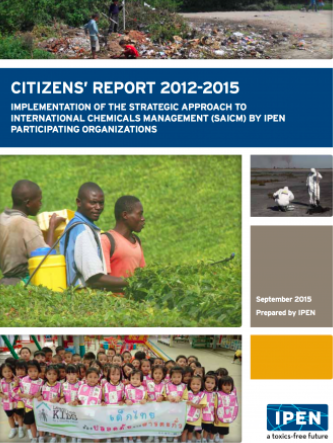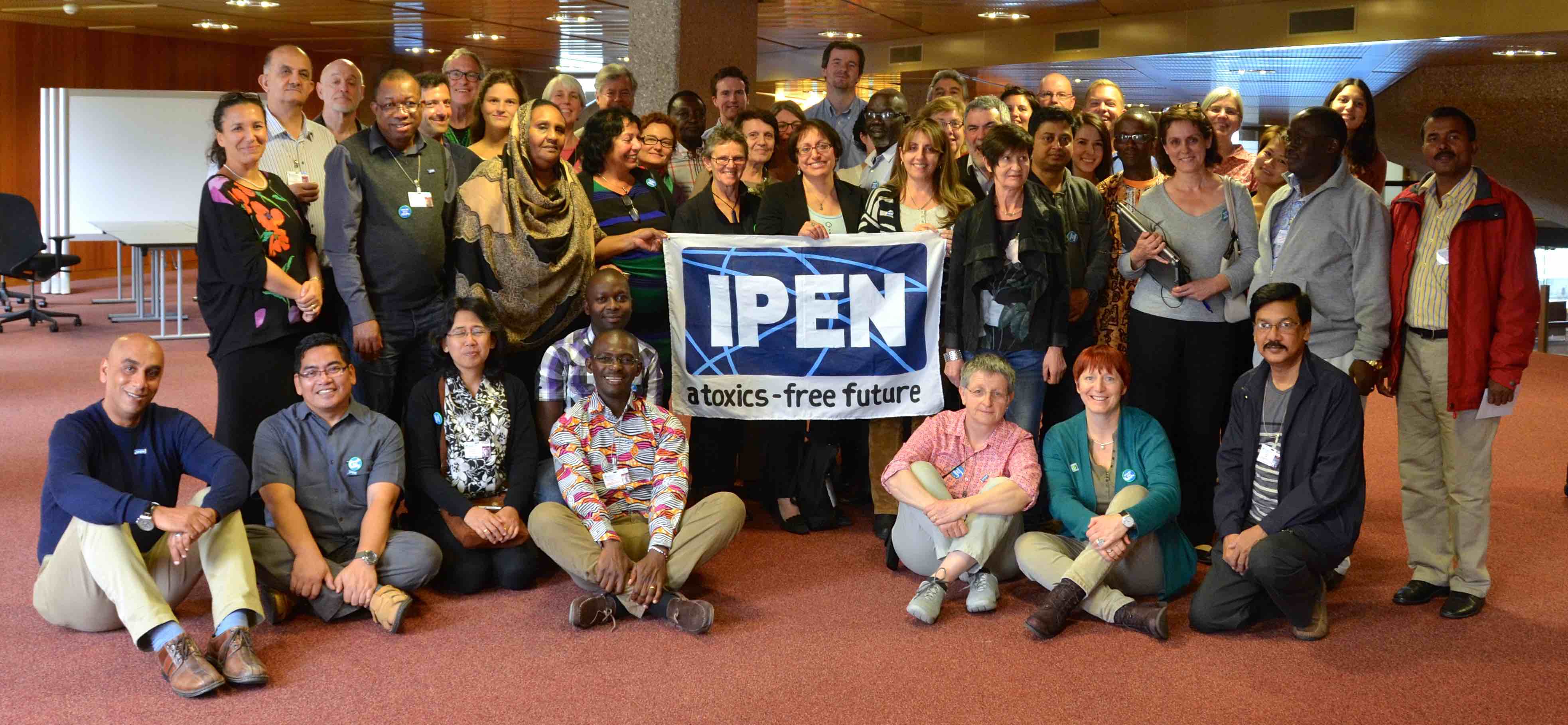The 4th meeting of the International Conference on Chemicals Management (ICCM4) for the Strategic Approach to International Chemicals Management (SAICM) was held in Geneva from 28 September to 2 October 2015 and numerous IPEN Participating Organization representatives attended. For details about IPEN's activities at the meeting, please see the tabs above. For more information (including an agenda, other meeting documents and more), see the SAICM website.
2 October: IPEN Press Release: World Conference Re-Commits to Action on Toxic Chemicals, but Lets Funding for Most Impacted Countries Expire
(Geneva) Delegates to the world’s only international forum addressing global and national chemical issues re-committed to take essential actions to fulfill a goal of sound chemicals management by 2020, but allowed the only program funding activities in the most impacted countries to expire. The USD $4 trillion/year chemical industry, which participates in the conference, also failed to offer new funds to pay their fair share for the costs of chemicals management and harm. A very small global levy on the industry of 0.1% would yield more than USD$4 billion/year.
“ICCM4 agreed to take action on some critical toxic chemical issues,” said Olga Speranskaya, Co-chair of IPEN. “However, a five-year funding gap will make it extremely difficult to implement them. This makes the need for funding urgent. Governments, financial institutions, intergovernmental organizations and the chemical industry must each pay their fair share,” she added.
Read the whole press release here.
2 October: Participation in United Nations Environment Programme (UNEP) Press Briefing
IPEN Co-Chair Olga Speranskaya took part in an UNEP press briefing on ICCM4, joining Mr. Achim Steiner (UNEP Executive Director), Dr. Richard Lesiyampe (Principal Secretary, Ministry of Environment and Natural Resources, Kenya and President of ICCM4), and Mr. Cal Dooley (President and CEO of the American Chemistry Council & ICCA Council Secretary). The briefing was held at the Palais des Nations, and excerpts can be viewed here.

2 October: IPEN Closing Statement
"Goodwill alone will not minimize adverse effects on the people most impacted by chemical exposure – women, children, workers and impoverished communities. Increased and sustainable funding and technical resources and a sense of urgency are needed if we are going to make progress against the occupational diseases, cancers, and compromised quality of life that millions of people around the world experience now, as we speak. We call on everyone involved – governments, international agencies, industry, and civil society – to make sound chemical management a priority."
Read the entire statement here.
28 September: Press Release
NGOs Seek Global Alliance for Phase-out of Highly Hazardous Pesticides at International Chemicals Meeting
(Geneva) More than a thousand non-governmental organizations (NGOs) from more than 100 countries called for the creation of a Global Alliance to Phase-out Highly Hazardous Pesticides (HHPs) today at the opening session of the world’s only forum on international chemical safety.
“In many developing and transition countries, ordinary conditions of pesticide use are a source of significant harm to farmer and ecosystem health. That’s why the governing Council of the UN Food and Agricultural Organization called for the progressive ban of HHPs in 2006. However, to this day, HHPs continue to be widely used and there is no comprehensive, international approach to their phase-out,” said Olga Speranskaya, IPEN Co-Chair. “It’s time for this meeting to take that step.”
Read the entire press release here.
IPEN’s Citizens’ Report details the implementation of the Strategic Approach to International Chemicals Management (SAICM) by IPEN Participating Organizations between 2012 and 2015. More than 120 IPEN Participating Organizations actively executed more than 500 activities in 65 countries in all UN regions to work towards implementing all five objectives of the SAICM Overarching Policy Strategy and 228 of the 299 items in the Global Plan of Action. Read the report here.

IPEN's Media Advisory provides information about some important developments to watch for and track at the ICCM4 meeting, including: the future of international cooperation on sound chemicals management, concrete steps to phase out highly hazardous pesticides, SAICM’s five-year plan, and the management of chemicals that fall outside of chemicals conventions.
This document is a summary statement of some IPEN views about issues that will be taken up at the ICCM4, including, among others, chemicals in products, lead in paint, electronics, the overall orientation and guidance (OOG) document, endocrine disruptors, nanotechnology and finances. Read the Quick Views here.
The 2006 decision that established the Strategic Approach to International Chemicals Management (SAICM) expires in 2020. In this thought starter, IPEN highlights some ways that SAICM has proven to be an extremely important international framework for promoting and advancing chemical safety objectives, and offers some suggestions to address the urgent question: what comes next? Read the thought starter here.
This letter from IPEN and Pesticide Action Network (PAN) was circulated to ICCM4 delegates to ask for support to establish a Global Alliance to Phase-out Highly Hazardous Pesticides (HHPs) at the 4th Conference on International Chemicals Management (ICCM4) meeting in Geneva, Switzerland. IPEN and PAN believe that such an Alliance, building on lessons learnt by the successful SAICM Global Alliance for the Elimination of Lead in Paint, is vital for assisting countries to adequately deal with HHPs and their replacement in a manner that supports the livelihoods of farmers. Read the letter here.

